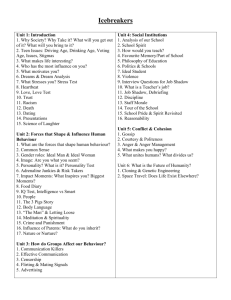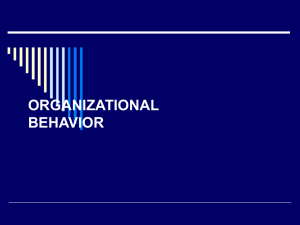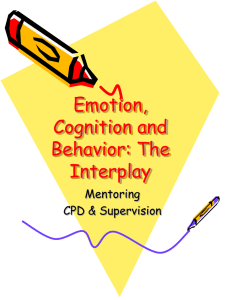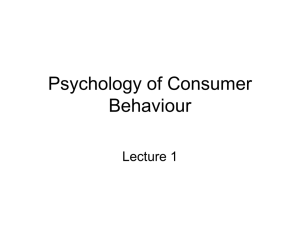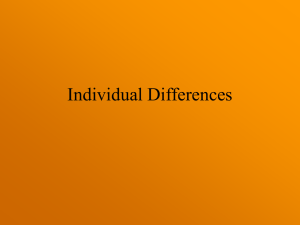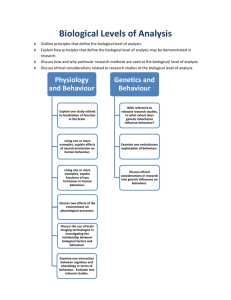File - IISWBM EVE Website
advertisement
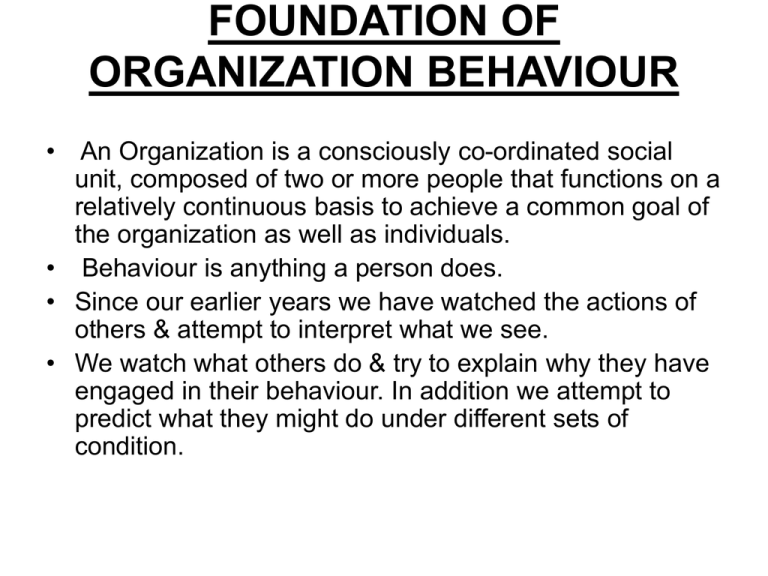
FOUNDATION OF ORGANIZATION BEHAVIOUR • An Organization is a consciously co-ordinated social unit, composed of two or more people that functions on a relatively continuous basis to achieve a common goal of the organization as well as individuals. • Behaviour is anything a person does. • Since our earlier years we have watched the actions of others & attempt to interpret what we see. • We watch what others do & try to explain why they have engaged in their behaviour. In addition we attempt to predict what they might do under different sets of condition. • In early part of 20 th. Century it was thought that in the working place workers were only interested for monetary gain .The workers were also thought of lazy type. The productivity was believed to be controlled by making financial benefit of the workers. • However, due to decline of productivity and profitability in some giant industries in the west it was thought that for maintaining discipline and welfare of the workers the post of Labour officer and Welfare Officer was introduced under Personnel Management department. • Labour Officers are responsible for Wage administration, Industrial disputes, Disciplinary actions, Formulation and Calculation of overtimes and incentives. • Welfare Officers are responsible for Statutory and Nonstatutory welfare, Leave record, Leave encashment etc. • After some period it has been noticed that the above factors are basically static and routine job. The Psychologist and Human Managers on research found the following points for not getting uniform output from the workers in industriesHuman is a complex mixture of Social, Economical, Political, Physiological, and Psychological product. He only comes to working place for earnings to survive himself and his family. There is something, more, which is necessary to be achieved and nurtured with respect to best kind of output from a human in work condition. • Thus, the idea of : i)Man is a complex psychological product. ii)They have needs and shifting of need is always playing. iii) Organization should think for participating situation.They should have some honors apart from wages in industry. have emerged. • The above ideas further nurtured that in an organization there are four inputs LAND, MACHINE, CAPITAL and HUMAN. Among these resources the first three can be best utilized by using the human resource. • Behaviour generally predictable & the systematic study of behaviour is a means to making reasonably accurate prediction • Systematic study means – looking at relationships, attempting to attribute causes & effects and basing our conclusions on scientific evidence i.e. on data gathered under controlled conditions and measured and interpreted in a reasonably rigorous manner. • Systematic analysis will enhance our effectiveness in accurately planning & predicting behaviour • Management has 3 major dimensions—technical, conceptual and human. The technical dimension consists of manager’s expertise or functional expertise in his area of specialization viz. Accounting, Engineering or marketing. The managers are well equipped to deal with this area of specialization for which he has sufficient knowledge and experience. • There is more needs for understanding conceptual and human dimensions of modern management. This is where the field of organizational behavior comes into the picture. Organizational Behavior is directly related with the conceptual and human side of management. • Man management concept in the past was that employees are lazy and are interested in money out of his job. Therefore in order to make them productive, management used to devise monitory incentive, ensure job security, provide good working conditions so that morale would be high and productivity would be improved and maintained. However, this approach of monitory incentive to extract productivity has changed. • The new perspective of man-management assumes that employees are extremely complex. Traditional human relation’s approach no longer has dominant role in the behavioural approach to management. There is a need for theoretical understanding backed by rigorous empirical research before application can be made for managing people effectively. • It is therefore obvious that people are the key factors in today’s challenges of downsizing, re-engineering, IT explosion, global competition, TQM etc. In all these activities, there is paradigm shift in the approach of man management, which is the key activity in any organization. • A systematic approach to the study of behaviour can improve our explanatory & predictive ability. •Definition of OB -OB is UNDERSTANDING , PREDICTING AND MANAGEMENT of human behavior in an organization. •All managers, regardless of their technical function, are human resource manager’s i.e. they deal with human behavior in the organization. Therefore all managers need to have an understanding and perspective of organizational behavior •OB represents the behavioural approach to management. Other approaches to management include process, quantitative, system and contingency approaches. OB does not portray total management. • OB attempts to provide specific, necessary background and skills to make the managers of today and tomorrow as effective with the conceptual and human dimensions of management as they have been in the past with technical and functional dimensions. • Field of OB • Contributing disciplines. HR Movements. Hawthorne studies. S-O-B-C Models for OB. • Organization Behavior is the studies of Human behavior towards the organization i.e. 1.How an individual’s behavior affects an organization. 2. Application of an individual in development of the organization by applying his intelligence • Personality of human – We have to study how personality develops in an individual. • INDIVIDUALAs a member of GROUPORGANIZATION • However the main areas contributing in OB are : • Personality system – Properties and traits of the individual, for example perception, attitude, motives, feelings & process or as a whole the individuals psychology. • Social system – Analysis of social structures and positions in those structures, for example the relationship between the behaviour of leaders and followers. • Cultural system – Beliefs, customs, ideas and values within a society which affect the emphasis individuals place on certain activities, for example the importance to Muslim women of wearing trousers to work. • Behavioral Science will cover • OB OT PM HR --- Both theory and application --- Organizational theory --- Personnel Management, 100 application --- Human Resource Management • Framework of OB • Organizational Behavior relates the various theoretical frameworks that serve as a foundation for a model of organizational behavior. • 1.Cognitive Framework The cognitive approach to human behavior has many sources of inputs. This approach emphasizes the positive and free will aspect of human behavior and uses concepts like expectancy, demand and incentive. COGNITION, which is the basic unit of cognitive framework, is an act of knowing an item of information. Cognition proceeds behavior and considers the person’s thinking, perception, problem solving and information processing. As per this theory every behavior is directed towards a particular goal. An animal becomes restless when it is hungry. The restlessness continues till its hunger is met. Cognitive approach is dependent on PERCEPTION, PERSONALITY and ATTITUDE, MOTIVATION and GOAL SETTING. • 2.Behavioristic Framework This is based on the work of Pavlov and Watson. As per this theory, every human behavior is based on stimulus-response explanation. A stimulus generates a response i.e. behavior. • 3. Social learning Framework This approach suggests that people are self aware and engaging purposeful behavior. People learn about the environment to make reinforces available and the importance of rules and symbolic process in learning.
